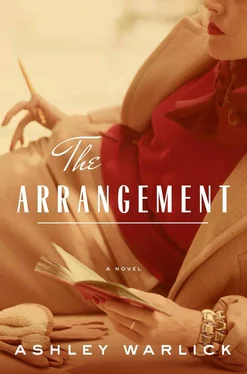She left an atlas open on the coffee table in front of the fire, but the pages never turned. She suggested books and movies, a drive down to the coast, and he would nod his head, tell her to go get ready, but she’d find him napping in his armchair half an hour later. She asked him if he’d talked to Larry, to Gordon, anybody at the college, but his answer was always no. She spent a lot of time watching him when he was lost in thought, and she stayed up late to write when she was alone.
For the holidays, they went to the Ranch. Anne was secretive and snippy. She took at least one private phone call in Rex’s office and came back as flushed as if she’d been sprinting up and down the stairs. Mary Frances knew she must be seeing someone, but she wouldn’t say, which meant she had a reason not to. She thought of Gigi’s friend Nan and the nine-month engagement she was bearing somewhere in San Francisco. It looked exhausting to be single, let alone a single mother.
Baby Sean was toddling to and from any reachable surface, babbling his sounds, and Edith kept asking when the next new baby might be on the way. Mary Frances and Al looked at each other politely and smiled, asked Edith for another slice of cake, or Rex for his thoughts on the governor’s race. Deflection seemed everyone’s default position, but when Mary Frances had Rex alone in his office, she explained more of what was going on.
“Al says he wants to adopt a baby.”
“Adopt?”
She could not look at him when she nodded, but she had always shared everything with Rex, the privileges of being oldest.
“Your mother didn’t have you the minute we were married. You shouldn’t be so hasty.”
“I’m not being hasty.” She sat on the edge of Rex’s desk, looking at her shoes.
“But someone is, if I catch your meaning.”
Mary Frances shrugged. “I don’t know. I don’t know what you’re supposed to know, what he’s supposed to know.”
Rex laughed. “You people spend too much time in school.”
“Daddy.”
“If you want a baby, Mary Frances, I have no doubt you’ll get one.”
“But Al has no job, no… drive.”
“Now, now. It’s the season for miracles, Dote.”
She let herself be led into another conversation, but it marked the first time a talk with her father had failed her, and she knew the fault was her own. She hadn’t been able to be honest with him. He’d see her differently in light of her correspondence with Tim, and whatever else she was carrying on there, and so she’d streamlined. She made a different story, one that was just as true as the real story. Her feelings for Tim were not so different from dreaming of being a writer, or an actress, a fantasy based on slender experience, slight encouragement, and the vast space inside her head to fill.
She hadn’t heard from him in weeks now. He was traveling Europe. She had no way to tell him they’d left Laurel Canyon, no good address in this country or another. The one thing Tim’s attention required was paper and ink, and while filling notebook after notebook, journal after journal, she realized what a flimsy requisite that really was.
Something drastic would have to happen now if they were to continue, something equally drastic as her starting a family to continue with Al. From where she stood, either prospect seemed both unlikely and necessary, vital. A rebirth.
* * *
After the new year, a letter from Tim arrived. He was grateful for their friendship, for the time they’d spent with Gigi. He understood from her that all was well and they had moved back to Eagle Rock. But he would like to repay their generosity, or perhaps ask another favor, it was hard for him to tell — but they were such good friends, he felt he didn’t need to stand on ceremony. Would Mary Frances be able to escort himself and his mother on a tour of France? They needed someone with her skills in companionship and conversation, both in English and in French. Mrs. Parrish wanted to revisit the places she had loved in her youth, and it seemed like the timing would be right in February…
“What do you think?” Mary Frances said.
Al let the letter fall to the tabletop. “What do you think?” he said.
* * *
Al did not sit on the edge of the bed and watch her pack. Into her trunks went clothes for the ship, silks and satins, the brocade pumps of Anne’s she’d admired at Christmas, Edith’s fox collar coat. She packed her French dictionary, needles, and yarn; it would be cold enough for mittens and scarves, and in Paris she would buy perfume. What was she packing for, really? She knew the sort of ladies companionship Tim suggested in his letter, the long stretches of tea and cards, museums and churches, but she would have his audience as well, unbroken, for weeks. She could not seem to push her imagination past that; perhaps she was not meant to.
From the other room, she could hear the drawers in Al’s desk open and close, the typewriter silent. She told herself this time would be good for him too, time to take up the poem again, but she’d tell herself anything that made it easier to leave.
He was standing in the doorway, his gaze now fastened on the spillage of slick color from the lip of the trunk.
“Your feathers,” he said, his smile tightly drawn.
Her hands felt thick and clumsy. She bundled empty hangers back into the closet, like a shuffling of bones.
“Do you remember,” Al said, “the summer I sent you to London with Edith? You didn’t want to go, but I thought it would be good for you.”
She remembered. Her mother believed the secret to a long marriage was a long vacation, but she had been crushed to leave him in Dijon, mostly because he seemed so anxious to be alone. It was then he began writing the poem. In September, she returned, and their honeymoon was over.
“You shouldn’t have done that,” Mary Frances said.
He braced his hand against the doorjamb, studying the frame, as if he planned to fell it. There was anger in him, but she could no longer tell if it was meant for her.
“I keep telling myself that,” he said. “I know.”
And so he loaded her bags into the Chrysler and drove her to the train. It was just a trip, he told himself, a last fling before they made their plans. He had not brought up the child again, but while she was gone, he would talk to some people, find out what their next steps needed to be. When she returned, she would be ready. He was grateful to Tim; they would not have this kind of opportunity again.
“You’ll write?” he said. “I meant to make it easy for you. Send some stamps and envelopes.” He laughed lamely. His chest was collapsing.
She reached into the satchel at her feet and pulled out a bundle of stationery bound with ribbon. She thumbed it like a deck of cards.
“One for every day, Al. Already addressed to you.”
At the station, he hefted her bags from the trunk to the porter, checked her tickets, escorted her to the platform to wait. She stood tall, she was so tall, with her hand folded sweetly in the crook of his arm, pale against his suit coat. He concentrated on that hand, the pale, slender fingers, the thin gold band. When the train pulled into the station, he passed her hand to the porter and watched the body of the train for a time, imagining her passage to her compartment, her hand once reaching out to steady herself before she found her seat, and was off.
She was writing as the train left the station, frantically, so as not to watch Al’s face, but god if she wasn’t writing to him. She couldn’t help herself — he seemed the only solid place to turn, and so she wrote him a letter then and there, how this was like a movie they were in, and this stretch of time just a memory that hadn’t happened yet. She would dissolve out with the steam and then back in a month from now, and they would continue. It was as honest as she could be. She loved him still, and she was unable to articulate the transgression she was about to make beyond that. She would go, and then she would return.
Читать дальше












